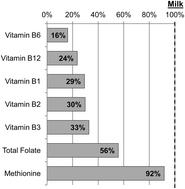Cheese ‘refinement’ with whey B-vitamin removal during precipitation potentially induces temporal ‘functional’ dietary shortage: homocysteine as a biomarker
Abstract
Cottage cheese ‘refinement’ with massive B-vitamin losses (≈70–84%) through whey removal during precipitation may potentially induce an acute imbalance between protein/methionine load and temporal inadequacy/shortage of nutrients critical for their metabolism, i.e. B6 and B12. The temporal effect of cottage cheese consumption was evaluated using increased plasma homocysteine as a B-vitamin shortage marker. In a double-blind study, healthy, normal-weight (BMI = 22–27), premenopausal women aged 25–45 years were first given a methionine load (100 mg kg−1, n = 15), then cottage cheese alone (500 g, ≈50 g protein, ≈1200 mg methionine, n = 49) at breakfast, and then with added B6 (2 mg, n = 8) and/or B6 + folate (1 mg + 200 mcg, n = 7). Plasma homocysteine was measured preprandially (t0) and then postprandially 5 h (t5) and ≥6–24 h. Cheese-induced homocysteine increased 28.7% (p ≤ 0.001), ≈60% of the free methionine response, remaining higher through ≥6–8 h. Co-supplementation with B6 reduced the Hcy increase by 45.0% (to 14.9%, p = 0.025), and that with B6 + folate reduced the Hcy increase by 72.3% (to 7.5%, p = 0.556, NS). Homocysteine increased more in participants with lower baselines (<5 μM vs. ≥5 μM, p ≤ 0.001) following cheese, ≈3-fold (54.8% vs. 18.5%) or methionine, 47.3% (266.7% vs. 181.1%). Cheese B-vitamin depletion – i.e. to B6 ≈ 2.0–4.0 μg g−1 protein, far below women's metabolic requirement (15–20 μg g−1) – appeared to induce acute relative shortage compared to methionine/protein loads, exemplified by greater homocysteine increases than with other animal proteins (previous data), more so with lower baseline homocysteine. Smaller increases following re-supplementation demonstrated potential for ‘functional fortification’/co-supplementation. Unnoted cheese ‘refinement’, like white bread, potentially induces episodic vitamin shortage effects, warranting consideration for acute/cumulative implications, alternative processing/supplementation technologies, and food combinations, especially for at-risk populations (i.e. with genetic, hormonal/gender, or aging-related predispositions), and for cardiovascular, bone, and brain health.


 Please wait while we load your content...
Please wait while we load your content...